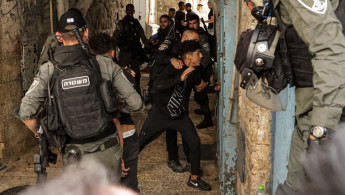Tensions persist after Israeli nationalists march into east Jerusalem
Tens of thousands of Israeli nationalists marched to Jerusalem's Old City on Thursday in an annual controversial flag-waving march commemorating Israel's occupation, as tensions on the Gaza border remained high.
Palestinians in occupied east Jerusalem closed their shops and were banned from the Damascus Gate entrance to the Old City, a social hub, to make way for the radical marchers, some of whom attacked journalists with rocks and bottles, an AFP reporter said.
Police said they made two arrests over the attack, one of an adult and one of a minor.
The United States, Israel's main ally, on Thursday, condemned demonstrators' "racist" chants calling for the killing of Arabs.
"The United States unequivocally opposes racist language of any form. We condemn the hateful chants such as 'Death to Arabs' during today's marches in Jerusalem," State Department spokesman Matthew Miller wrote on Twitter.
In Gaza, thousands gathered for a rival flag day on the Israeli border, many of them holding Palestinian flags.
Israeli troops fired tear gas towards anyone approaching the border fence, AFP reporters said.
A Palestinian security source in Gaza said the territory's rulers, the Islamic movement Hamas, fired a "warning rocket" into the sea, without elaborating.
Ahead of the Israeli march, the militant group said it "condemns the campaign of the Zionist occupation (Israel) against our Palestinian people in occupied Jerusalem".
Two years ago, after weeks of violence in Jerusalem in which scores of Palestinians were wounded, Israel also launched a war on Hamas and Gaza during the march.
Speaking late Thursday morning, Israeli Prime Minister Benjamin Netanyahu said the celebrations were being held in Jerusalem "75 years after it was re-established as the capital of the reborn state of Israel, and 56 years after being reunited".
Two of his extreme-right cabinet members, Itamar Ben-Gvir and Bezalel Smotrich, attended Thursday's march, one of the events marking what Israelis refer to as Jerusalem Day.
"Today, we say to Hamas who threatened us: 'Jerusalem is ours,'" Ben-Gvir said in a statement.
Following the 1967 war, Israel annexed east Jerusalem and its Old City in a move never recognised by the international community or in international law.
Thursday's rally took place days into a ceasefire that ended deadly cross-border fighting between Israel and Islamic Jihad armed fighters in Gaza.
Thirty-three people, mostly women and children, were killed in the blockaded Palestinian enclave and two in Israel, a citizen and a Gazan labourer.
Thursday's march began in the western part of the city before passing into east Jerusalem and through the Old City to the Western Wall, where about 50,000 people took part in the Jewish evening prayer, according to local authorities.
Those marching were mostly young men, with some wearing white T-shirts and carrying Israeli flags, as about 2,500 police officers looked on.
Before the march began, Palestinians with shops in the Old City closed up for the day.
Resident Abu al-Abed, 72, said he wanted "to go home".
The marchers "are harmful, they're walking and start to hit the doors of the shops and the doors of our houses," he told AFP.
Scuffles between Jewish and Palestinian youths took place as early marchers arrived in the Old City, with police saying that in some cases forces "were required to act to prevent friction and provocations".
But the violence was greatly reduced from last year when at least 79 people were wounded as police clashed with Palestinian counter-protesters outside the Damascus Gate.
Before the march, dozens of Jews - including at least three lawmakers from Netanyahu's right-wing Likud party and a minister from Ben-Gvir's Jewish Power faction - visited Jerusalem's Al-Aqsa mosque compound, Islam's third-holiest site.
Jews, who call it the Temple Mount and revere it as their religion's holiest site, are allowed to visit but not pray.
One of them, Tom Nissani, was sitting at Jaffa Gate with an Israeli flag, awaiting the march.
"It's our capital city, we have to show it, to enjoy it, to fight for it," the 34-year-old West Bank settler, who works for an organisation promoting a Jewish presence on the flashpoint site, told AFP.
Transport Minister Miri Regev, from Netanyahu's Likud, was among Israelis waving flags at the Damascus Gate hours before the official rally.
A spokesman for Palestinian president Mahmud Abbas warned Israel "against insisting on organising the provocative flag march".
Pushing ahead with the parade "confirms the acquiescence of the Israeli government to Jewish extremists", spokesman Nabil Abu Rudeineh said Wednesday.
Since last year's rally, Israel's leadership has shifted to the far right.
Ben-Gvir, the country's national security minister, was convicted in 2007 of supporting a terrorist group and inciting racism.
Far-right ally Smotrich holds the finance portfolio along with some powers in the occupied West Bank and also has a history of inflammatory remarks about Palestinians.





 Follow the Middle East's top stories in English at The New Arab on Google News
Follow the Middle East's top stories in English at The New Arab on Google News


